Midnight Club: Los Angeles Hands-On
We go hands-on with the first in this reinvented racing series in our latest behind-the-scenes Rockstar preview.
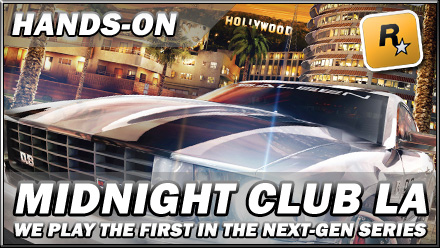
We think Midnight Club: Los Angeles is currently one of the most overlooked prospects of this console generation. As we mentioned in our first preview last year, it looks awesome, and our new hands-on with a new build of the game cements our view that this is not just a hot game to look out for later this year, but also an essential racing series that is set to go beyond Los Angeles.
But we're getting ahead of ourselves! What's new since we last looked at the game? The series formula has always given people several open, real-world cities to cruise around and instigate races at leisure. For Rockstar San Diego to play with the formula, they've got to be pretty confident they're doing it in the right way.
Previously multiple cities were needed for variety, but now with the whole of Los Angeles possible on PS3 and Xbox 360, there's plenty of variety within the SoCal areas of Santa Monica, Hollywood Hills and Downtown. Our Rockstar man reckons it's bigger than all three cities from Midnight Club 3: DUB Edition, combined.
The freedom is still there, but Rockstar has added to the formula with reputation points. Every single race you do, whether you finish first or last, will earn you reputation points and money. Obviously first place nets you more than last, but even if you finish last you're still getting something. The points you accumulate will unlock suitable parts, vehicles, and races.
In theory you could do the first race of the game a million times coming last in every race and still complete the game -- it's the end of difficulty spikes, reckons Rockstar. If you're stuck behind one particular opponent and can't compete because he simply has a faster vehicle than you currently do, you'll earn enough reputation points from not beating him to go to the garage and get a new car to be able to compete next time around. Or, if you're bored with him you can leave it and move on; you don't have to do any one race - there's no pyramid where you're forced to beat someone.
The new Midnight Club offers pretty standard racing game controls, but it's the stunning sense of speed - something like three times as fast as the fastest vehicle action in GTA IV, in our estimation - that highlights the list of MCLA's gameplay successes. Rockstar has put real energy into making the game feel energetic and slick, right down to the way the camera shakes about from the sheer POWER of everything. The game is pretty forgiving in terms of crashes and collisions, enabling you to get on with the race and stay involved. But rest assured that when you do crash, it's spectacular in all its slow-mo-o-vision glory.
Moreover, the city has been adapted to optimise enjoyment of racing. On the GTA IV style 'radar' map roads are marked in black, but there are also short cuts marked in gray - and there are also plenty of short cuts that aren't even shown. Naturally there'll also be plenty of jumps, the most extreme of which can land you on top of buildings. Opponents are shown as green, yellow, orange, and red markers, indicating their difficulty level, and since you can't lock onto their constantly moving positions, the indicator updates you as to their location as you go along.

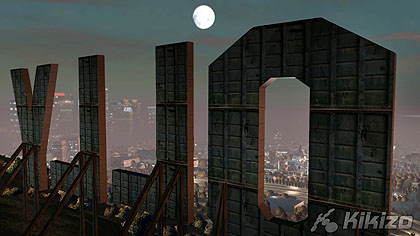
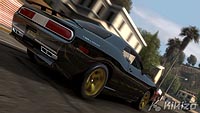
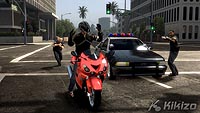
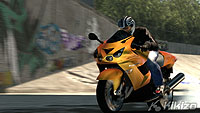

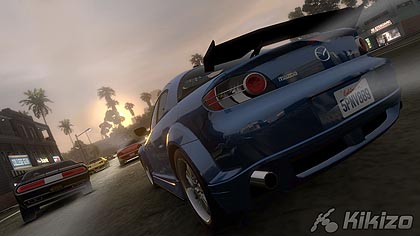




 Satoru Iwata Video Interview - the late Nintendo president spoke with Kikizo in 2004 as 'Nintendo Revolution' loomed.
Satoru Iwata Video Interview - the late Nintendo president spoke with Kikizo in 2004 as 'Nintendo Revolution' loomed. Kaz Hirai Video Interview - the first of Kikizo's interviews with the man who went on to become global head of Sony.
Kaz Hirai Video Interview - the first of Kikizo's interviews with the man who went on to become global head of Sony. Ed Fries Video Interview - one of Xbox's founders discusses an epic journey from Excel to Xbox.
Ed Fries Video Interview - one of Xbox's founders discusses an epic journey from Excel to Xbox. Yu Suzuki, the Kikizo Interview - we spend time with one of gaming's most revered creators.
Yu Suzuki, the Kikizo Interview - we spend time with one of gaming's most revered creators. Tetris - The Making of an Icon: Alexey Pajitnov and Henk Rogers reveal the fascinating story behind Tetris
Tetris - The Making of an Icon: Alexey Pajitnov and Henk Rogers reveal the fascinating story behind Tetris Rare founders, Chris and Tim Stamper - their only interview? Genuinely 'rare' sit down with founders of the legendary studio.
Rare founders, Chris and Tim Stamper - their only interview? Genuinely 'rare' sit down with founders of the legendary studio. The History of First-Person Shooters - a retrospective, from Maze War to Modern Warfare
The History of First-Person Shooters - a retrospective, from Maze War to Modern Warfare